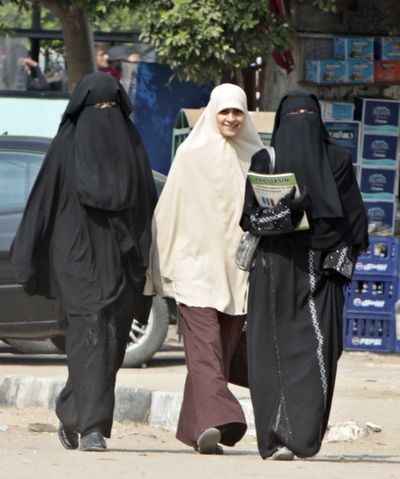Egypt’s top cleric bans face veil at some schools

CAIRO – Egypt’s top Islamic cleric said Thursday that students and teachers will not be allowed to wear face veils in classrooms and dormitories of Sunni Islam’s premier institute of learning, al-Azhar, part of a government effort to curb radical Islamic practices.
The decision announced by Sheik of al-Azhar Mohammed Sayyed Tantawi came days after he said the face veil, or niqab, “has nothing to do with Islam.” His comments and actions have sparked an outcry from Islamists who see them as an attack on their religion and some rights organizations who believe banning the niqab violates constitutional freedom.
The explosive issue of how much of a Muslim woman’s body should be covered remains contested among Islamic scholars. The majority of scholars say the face veil is not required but is merely a custom that dates back to tribal, nomadic societies living in the Arabian desert before Islam began.
While a vast majority of Egyptian women wear headscarves, few wear the niqab, which is common in Saudi Arabia where the more conservative form of Wahhabi Islam is practiced. The trend seems to be gaining ground in Egypt, leading to government attempts to ban the face veil from public institutions.
Tantawi, who was appointed by the Egyptian government, first attacked the niqab Sunday during a field visit to a middle school where he asked a student to remove her face veil, according to local media.
Al-Azhar schools are segregated between men and women.
The cleric said Thursday that his decision to impose a partial ban is based on a 1996 constitutional court ruling that granted education officials the right to regulate Islamic attire in schools. He said the goal was to “spread trust, harmony … and the correct understanding of religion among girls.”
Tantawi said al-Azhar does not oppose women wearing the niqab in al-Azhar schoolyards.
A militant Palestinian group, Jund Ansar Allah, posted a statement on the Internet on Wednesday criticizing Tantawi and calling on Muslims to carry out attacks against the Egyptian government.
Al-Azhar oversees education in over 8,000 schools that offer basic and secondary education to more than 1 million students. The schools mostly offer religious education and operate in parallel to public schooling.